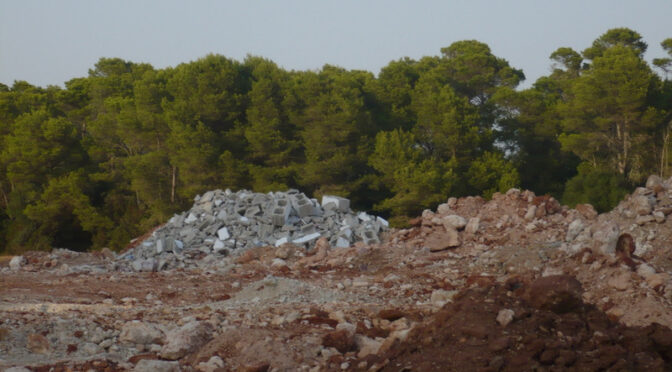Views: 392
The Binigarba property is obliged to make restitution of all the illegal works carried out without licence on various areas. The City Council of Ciutadella communicated, seven months ago, the obligation for immediate restitution, but there has been no compliance with the deadlines.
Some years ago, on various occasions, Binigarba tried to make sand extractions in alliance with the entrepreneur, Valerianao Allès, but no industrial exploitation was ever authorised. Later, the area was catalogued, at a European level, as being within the Nature 2000 network of protected areas.
However, using the argument of making agricultural land better, sand extractions and the dumping of construction debris started. The initial project was planned to extract more than 400,000 cubic meters of sand, until repeated official complaints were made to stop it. However, the developers decided to carry on with the works but without either licence or environmental authorisation, which led to the opening of disciplinary proceedings.
At the end of an administrative period the restitution of the property should be undergone, with a warning of coercive fines. The resolution was announced seven months ago but nothing has been done.
The City Council’s communication was received at the beginning of April that ordered the Unidad Agropecuaria Binigarba SRM, as the developer and property owner, to make the restitution of the land. This was where works had been executed without the mandatory licence and were illegal and now there was an obligation for the land to be returned to its original state within two months.
To carry out the effective restitution of the cited works, the developer should present the restitution project and the appointment of the managing technicians to the City Council within a month from the notification of the agreement.
Under the Town Planning Act, the City Council has a month to give approval. After this period has elapsed, if the municipality has not notified the interested party to the contrary, the time-period for the execution of the restitution works will have begun.
Non-compliance, for completing the restitution works to re-establish the original physical state, gives rise to the imposition of up to twelve coercive fines, amounting to, on each occasion, 10% of the value of the works. Once the fines have been imposed, the City Council is able to organise the execution of the restitution and recoup the cost from the developers.
GOB has asked the Town Council to specify:
- The date the agreement referred to the promoters was given
- What coercive fines were given and the dates they were applied
- What disciplinary proceedings have been opened, beyond the restitution obligation, and if these include the developer, the builders and the managing technicians
- What is the timetable expected for the effective restitution in question
GOB considers that this is an example of mal practice, because they tried to cheat doing one thing instead of another by making a significant alteration to a protected area, by throwing construction waste that should at all times go to a treatment plant into rustic land where it was buried, by removing nearly a kilometre of dry stone walling and by acting in full knowledge that they lacked a licence.
Cases such as these cannot go unpunished when the island’s values are to be maintained.

